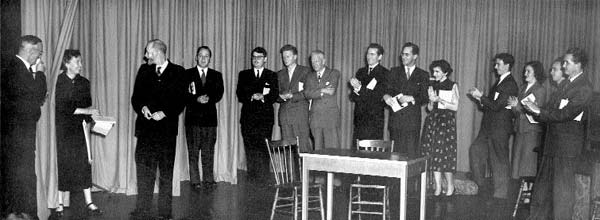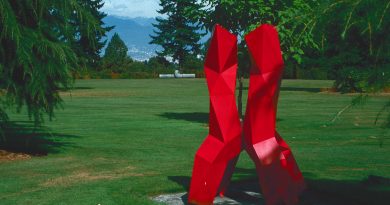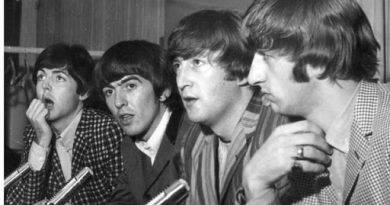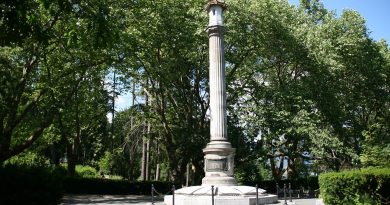1952
Above: Opening night of Earle Birney’s Trial of a City (The Damnation of Vancouver) at the new Frederic Wood Theatre. Left to right: Frederic Wood, Dorothy Somerset, Earle Birney, Art Sager, Allan Ainsworth, Don Erickson, Eric Vale, James Johnston, Blair Baillie, Nancy Woodworth, Philip Keatley, Elizabeth Keatley, Don Withrow, Bill Buckingham.
[Image: University of British Columbia Archives]
*****************************************
You’ll note that these years include events listed under “Also in . . .” These are events for which we don’t have a specific date. If YOU know the specific date of an event shown there, please notify us . . . and cite the source! Many thanks!
*****************************************
January 25 At 8:30 p.m. CBR 1130 moved to 690 on the dial and changed its call letters to CBU. See this site.
January The great American bass Paul Robeson had performed at the Orpheum February 7, 1946, and 3,000 fans in the sold-out theatre kept him coming back for more and more. But a hint of troubles ahead could be seen in the Sun’s warm review by Stanley Bligh. Bligh wrote of that 1946 concert: “In addition to his great success in the artistic field, the eminent Negro has won an outstanding place in the world by his firm stand on the question of racial equality, his knowledge of languages, international economics and his wide sympathy for the oppressed peoples of the whole globe.”
That sympathy would get him into trouble.
Robeson’s knowledge of languages was impressive. Besides his native English, he spoke Hebrew, Chinese, Norwegian and Spanish. That came from his extensive travels . . . which included trips to Russia. In an interview, Robeson had told the Sun: “I deeply believe Russia is now the world’s most positive force for good, if we will help her.”
It was 1952, and the cold war had the US in a deep freeze. Robeson’s opinions, and his favorable view of the Communist Party (although he was never a member), resulted in a refusal by the U.S. to allow him to return to Vancouver for another concert in January, 1952. He was stopped at Blaine. Local unions organized a free outdoor concert at the Peace Arch, and it attracted 25,000 people on the Canadian side, 5,000 on the U.S. side.
Robeson is now back in favor. The U.S. has issued a postage stamp to honor him.
See this site.
February 1, 2 Louis Armstrong and the All-Stars appeared in the auditorium of Kitsilano High School.
February 6 King George VI, aged just 56, died, and his daughter Elizabeth, 25, became Queen. She heard of his death while on a holiday in Kenya with her husband, Prince Philip. Vancouver and the rest of the British Commonwealth mourned the passing of the King. A 21-gun salute was fired at Brockton Point February 7 to mark the succession to the throne of Elizabeth II. Her coronation would occur June 2, 1953.
John Nicholson of the Old Cambrians Society was in Kenya in 1952 and took a candid shot (right) of the Princess as she was driven by. Prince Philip is next to her, but obscured. (The King was still alive when this photo was taken.) Our thanks to Mr. Nicholson for permission to reproduce his photograph. For a charming reminiscence by him, see this site.
February 11 Alan Twigg, founder of BC Bookworld, was born. See this site.
February 12 Tolls were removed from Pattullo Bridge.
March 13 Susan Mendelson was born in Toronto. Few kitchens in B.C. lack a cookbook by Susan Mendelson. There are now eight in print. The first, Mama Never Cooked Like This, sold 7,000 copies on its first day. See this site.
March 24 Actor Nicholas Campbell was born in Toronto. He plays (superbly) the title character, coroner Dominic Da Vinci, on CBC-TV’s Da Vinci’s Inquest, the best show to come out of Vancouver television in years. See this site.
April 4 Vancouver got its first taste of 3-D movie making with a really bad movie set in Africa and called Bwana Devil, starring Robert Stack. Look out for that lion!
April 11-19 Duke Ellington played a gig at the Palomar Supper Club in Vancouver. See this site.
April 23 In her column in The Vancouver Sun, Penny Wise told of a visiting American who complained he couldn’t find any restaurant in Vancouver that served something called a Caesar salad. Penny wrote that she’d never heard of it. But she found a recipe for it and shared it with her readers. So now we can date fairly specifically the arrival on the local scene of the Caesar. The salad had been known in the States for many years, but there is a dispute over when and where it originated and who created it.
May 12 Actor/director/producer Christopher Gaze was born in Leatherhead, England. He originated and still heads Bard on the Beach Shakespeare Festival, now an annual and much-loved tradition in Vancouver. Thanks to the efforts of Gaze and his staff, Bard receives less than one per cent of its income from government grants. See this site.
July 15 The present Lumberman’s Arch is installed at Stanley Park.
July 18 The Vancouver Sun noted that the Vancouver Tourist Association had no women on its board.
August 1 New Brunswick-born William Andrew Cecil Bennett became premier of BC. He will serve to September 15, 1972, just over 20 years, making him our longest-serving premier.
August 16 From the Sun “The postman rings four times daily, and statistically one-and-a-half persons per minute come into the over-crowded offices at the corner of Georgia and Seymour which house Vancouver’s Tourist Bureau . . .”
September 4 The UBC Law Building was opened by Prime Minister Louis St. Laurent.
October 18-21 Sweet, dithery US movie actress ZaSu Pitts, 58, appeared in Vancouver in The Late Christopher Bean with the Everyman Theatre. During her visit here, ZaSu was startled to learn Canada was not a British Colony. The Internet Movie DataBase lists her in 204 movies.
October 19 The first sod was turned for St Anselm Anglican Church at Cleveland Way and University Boulevard.
October 20 Vancouver had two notable visitors today: Governor General Vincent Massey (our first Canadian-born GG) was in town, and so was singer Jeannette MacDonald, performing at the Georgia Auditorium.
November 1 First H-Bomb.
November 16 James Inglis Reid died today. He was 78. His famous high-ceilinged butcher’s shop at 559 Granville, which had opened in 1915, was almost as famous for its signs as for the special meats and haggis it sold. The most celebrated sign read: “We hae meat that ye can eat.” The meats included Ayrshire bacon, Belfast ham, black pudding and oatmeal-coated sausage. The Scottish-born (Kirkintilloch) Reid had come to Vancouver in 1906, at 32. Another Scot, H. Nelson Menzies, joined him in 1917. Long service was a constant at Reid’s. When the shop closed in December 1986—forced out by Pacific Centre expansion—its manager, Gordon Wyness, had been there 41 years.
December 6 The official opening of the Frederic Wood Theatre at UBC. A member of Sydney Risk’s company and a former student of Dorothy Somerset’s, Joy Coghill directed Earle Birney’s play Trial of a City (original title: Damnation of Vancouver) for the official opening. See here.
Also in 1952
Fred Amess became Principal of the Vancouver School of Art.
The Mau Mau rebellion began in Kenya. One observer: 14-year-old Vancouver-born future B.C. politician Gordon Wilson.
A Hollywood movie titled Hurricane Smith starred two Vancouver-born actors, Yvonne De Carlo and John Ireland.
The West Vancouver Chamber of Commerce was incorporated. See this site.
The Greater Vancouver Tourist Association changed its name to the Vancouver Tourist Association.
Firoz Rasul, Ballard Power Systems chairman emeritus today, was born in Kenya.
Vancouver city council approved the naming of several city streets after famous golf courses. That gave us Seigniory, Leaside, Uplands, Bonnacord, Scarboro, Bonnyvale, Brigadoon and Bobolink.




